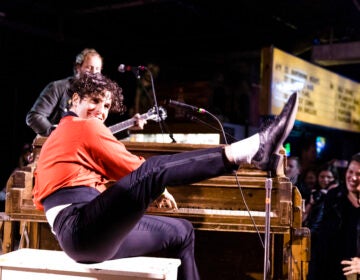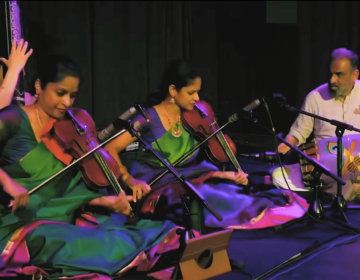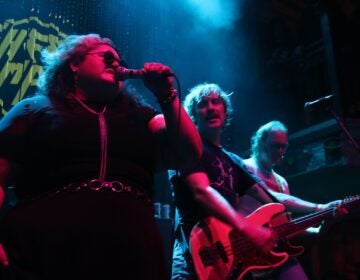For Philly’s Low Cut Connie, protest songs and American dissent are ‘patriotic’
Singer-songwriter Adam Weiner talks protest songs, fear, and American identity ahead of nationwide “No Kings” protests.
Listen 9:16
Adam Weiner of Low Cut Connie performing at Innings Festival at Tempe Beach Park on Sunday, Feb, 27 2022, in Tempe, Ariz. (Photo by Amy Harris/Invision/AP)
From Philly and the Pa. suburbs to South Jersey and Delaware, what would you like WHYY News to cover? Let us know!
This Saturday marks a historic trifecta: Flag Day, the 250th anniversary of the U.S. Army and President Donald Trump’s birthday.
It has also become a day of nationwide protest, as demonstrators across the country plan to observe the No Kings Nationwide Day of Defiance — a movement organized in response to concerns about rising authoritarianism.
Cities nationwide expect marches and rallies, with Philadelphia preparing for one of the largest turnouts. Organizers expect hundreds of thousands to take to the streets in a show of resistance.
WHYY “Morning Edition” host Jennifer Lynn spoke with Philadelphia singer-songwriter Adam Weiner of Low Cut Connie about his protest anthem “Livin in the USA.” The song highlights themes of political unrest at a time of federal budget cuts, tariffs and the growing marginalization of vulnerable communities.
__
Jennifer Lynn: This is WHYY’s “Morning Edition.” Good morning, I’m Jennifer Lynn. Tomorrow, June 14, is Flag Day, the Army’s 250th anniversary and President Donald Trump’s birthday. It’s also the No Kings Nationwide Day of Defiance. Protests are planned across the country, including one in Philadelphia, to show what democracy looks like and to decry many of the president’s recent policies. Taking to the streets peacefully for gatherings is one way to make a statement. This morning, we explore another: the protest song.
Adam Weiner [NAT SOUND]
“Livin in the USA, but it ain’t my home. Livin in a USA, but it ain’t my home. My kind of people, they never gonna leave us alone. My kind of people, they never gonna leave us alone.”
JL: That’s Philadelphia singer-songwriter Adam Weiner of “Low Cut Connie.” Weiner says his newly released song “Livin in the USA” points out how our lives have changed in today’s political climate of federal government cuts, tariffs and strong feelings of isolation and rejection of the marginalized. I spoke with Adam Weiner about this song ahead of tomorrow’s No Kings rallies and events.
JL: “Who are my kind of people?” — a line from this song, “Livin in the USA.” You know, who are my kind of people?
AW: My kind of people — I mean, I’m really referring to the underclasses, which is a phrase that I never thought we would use so frequently in America. In my lifetime, between my fans and my family and my friend group, I have people from so many different walks of life: the queer community, Black, Hispanic, immigrants — people who are suddenly, maybe not so suddenly, just feeling under siege, or their ability to be in this country or be free in this country is threatened. And it’s every single night that I’m on tour, I’m encountering this kind of fear.
JL: And where do you feel it? Where do you feel disconnection to being in the USA, living in the U.S.A?
AW: Well, working as an artist, I’m used to having to do the job of bringing people together in divisive times, but it’s very recent that the job has not only become difficult, I released this song, and there have been a number of people that have had a terrible reaction to it — who say really, really horrible things, that I shouldn’t have a right to put a song out like this or say what I’m saying. And earlier this year, I was supposed to play at the Kennedy Center. That was a dream come true. It was an honor to be considered, and I was part of this series that they were doing that had to do with diversity. As soon as I saw what was happening at the Kennedy Center — the dismantling of the staff, the board and the programming — I said, this is not the place for me. I pulled out of my show at the Kennedy Center, and the reaction I got was shocking to me. It was not only national news but international news. And of course, Jennifer, it was 85% supportive, but that 15% of negativity was very vitriolic — more than I’ve ever seen, in a way that’s a little scarier than it used to be.
JL: Did you write this song right after that?
AW: I wrote this song a long time ago.
JL: Oh, when did you write this song?
AW: It’s so funny. I had a song many, many, many, many years ago when I was spending time in England performing, and I wrote a song — “Living in England, baby, but it ain’t my home.” It was a song about feeling homesick and a little bit alienated over there. And I looked at the lyrics, which were mostly about — even as an adult — how we have these moments where we feel scared in the way that a child is scared. And it was very easy for me to see that if I changed the lyric to the U.S.A., that I had a complete song and a complete thought. And it worked in every single context that I played it. People come to me, because I have a microphone in my hand, and they ask me what I think will happen with this, this and this. I don’t know at all. And I felt this was the moment to put out this song, because we’re at peak disorientation in the U.S. at the moment.
JL: What did you get off your chest in the song? Is that an experience that you had — getting something off your chest? Or was it deeper than that?
AW: I don’t feel like I got something off my chest. I feel like I just expressed a very simple feeling, which is fear — which is something I hadn’t done before in my music. You know, I’m in a rock and roll band. I run around screaming, yelling, tearing my clothes off. I’ve never put a song out that just says, “I’m scared. I don’t know what’s going to happen in life.” It’s been very touching to see people say, “You know, I feel like you really nailed how I’ve been feeling the last few months.” That’s my job — to try to resonate with people. So I do appreciate that.
JL: Where is the protest in this song? Is it more the mood of the music? Is it the words? Is it how they’re married together?
AW: It’s so funny that you asked that, because a song is a living organism. And it’s not just about me — the singer, the writer, the piano, the recording — it’s about how it’s received and the context it’s received, right? You could talk about Aretha Franklin’s song “Respect” — you could call it a love song, and you could call it a protest song depending on the context it’s received in. This song, “Livin in the USA,” has been received as a protest song because of the era that we’re living in, this age that we’re in. Politics is on people’s minds 24/7. We should have our eyes open. And I don’t think that my song should be listened to in a pure, escapist context.
JL: What do you think of the question, if someone were to put to you, “Do you love your country?”
AW: Isn’t it sad that that question feels so loaded now? But I will tell you with no hesitation, every single night on stage on my tour that I’ve just been doing, I talk about how I love my community. I love my people, my family, my neighbors and I truly and deeply love my country. I play big towns, little towns, rural, urban — all over. I love America. I love this country, and I’m so deeply fascinated by it. And I don’t think it’s wrong to speak out about the things about the country that I feel are going wrong or under threat. I think that is patriotic. I think that is the American way — to talk about it.
WHYY is your source for fact-based, in-depth journalism and information. As a nonprofit organization, we rely on financial support from readers like you. Please give today.






